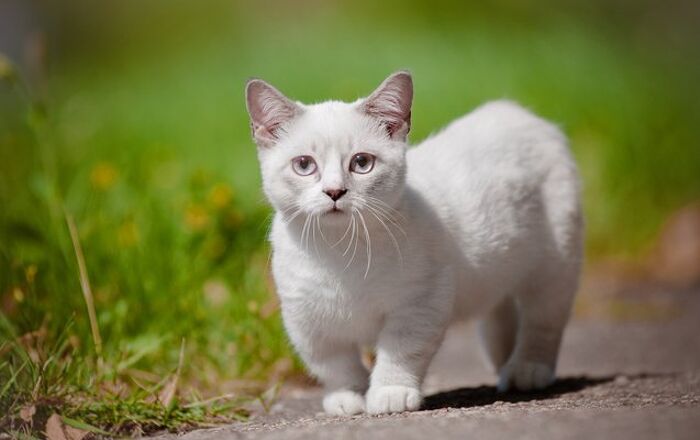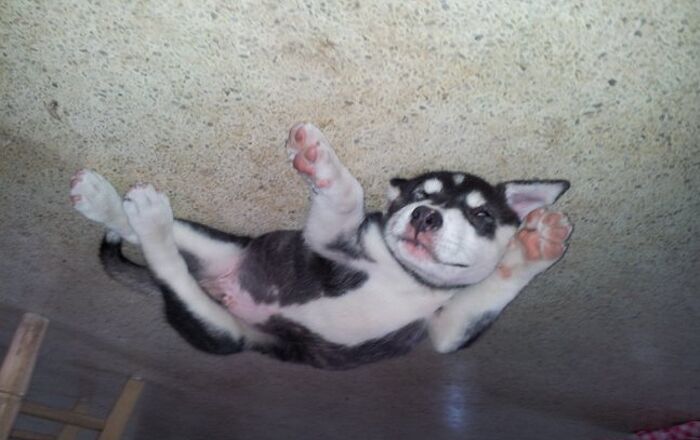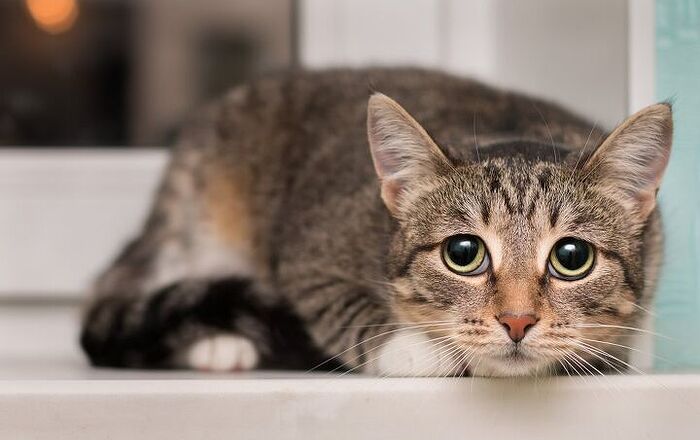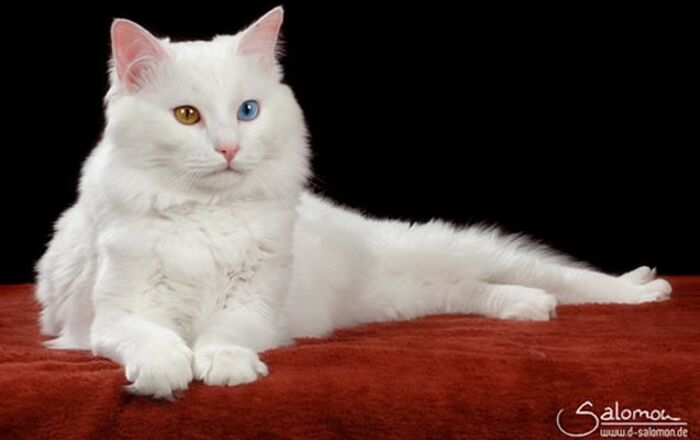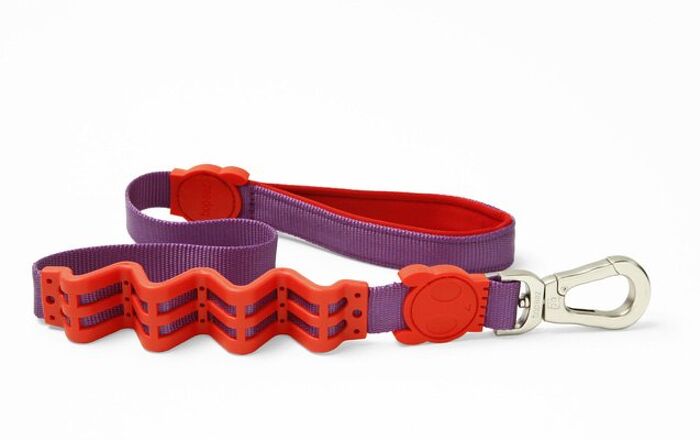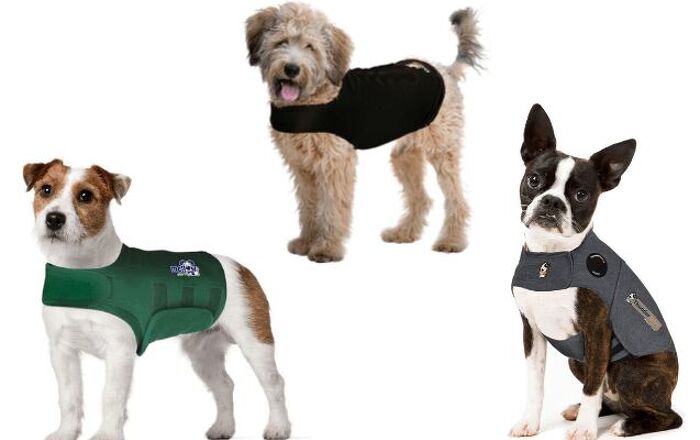I’ve had it pretty lucky for the past several years in that my cats haven’t been prone to jumping up on my kitchen counters. They’re quick to climb up onto furniture, scale the dining room table and claim a comfy pillow at the head of my bed. But kitchen counters have never been their thing.
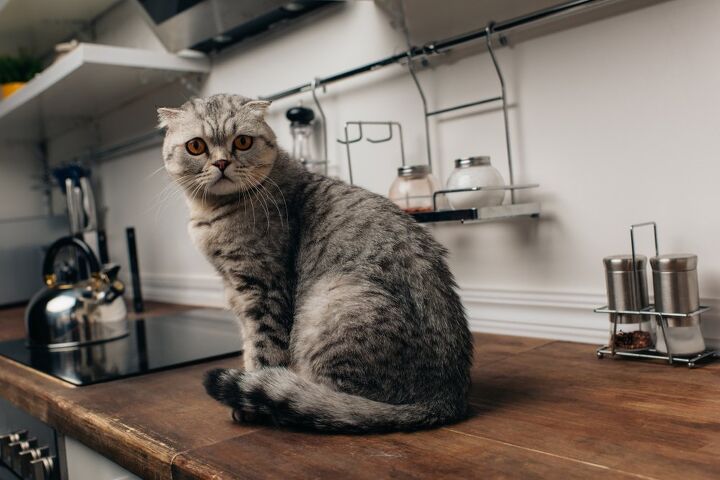
That is until Pumpkin arrived.
At over 20 pounds, this feline is, as his name implies, a big boy. And you’d be right to assume that he doesn’t miss a meal. This on its own may be why he’s so keen to monitor the food prep process in an up-close and personal manner. He may also have noticed that his favorite treats and those tins of wet food are stored in an upper cupboard. Or that fresh, cold water is fun and easy to access from a dripping tap.
Whatever the draw, this large, surprisingly agile cat is up in the blink of an eye and calmly strolling by the microwave without so much as a grunt.
What to do? When it comes to curtailing our curious cats, we need to take a look at not only how we can stop them but also at why they’re doing it in the first place. Because let’s face it, if you don’t eliminate the draw and discourage future jumping, you’ll never know what goes down the moment you lock that front door and head off to work. And while we love our uber-clean kitties, their paws can carry any level of germs and bacteria due to using their litter boxes, walking through gardens, across floors and even nursing an injured paw that might be infected.
So, if we can all agree that counters aren’t the place for our feline friends, let’s look at some of the potential reasons your cat may feel differently:
1) Do you conduct a thorough clean-up after meal prep? Be honest. Do you ever leave the juices from meat, fowl or fish on a platter after you’ve put the leftovers away? Or dirty dishes in the sink to “soak” overnight?
2) Does your counter include a window with birds chirping or leaves/branches moving around that he might consider entertaining?
3) Are his treats kept in a jar on the counter? And does he observe as you access and dispense said treats from this container?
4) Do you have multiple pets that may chase or harass your cat and cause him to want to be up high in order to escape and/or observe?
5) Does your tap drip and have you ever caught him self-helping or entertaining himself by dipping his paws into those drips? Note that with cats, suspecting he’s been up to something nefarious is almost the same as catching him in the act.
While some of our own behaviors such as leaving food out can be modified, others, such as the location of a window or a lack of enclosed storage, can’t be. And these are what lead to our five tips that can help discourage our curious kitty’s from strolling the counter.
The first two suggestions work well for those who leave the house for several hours a day and want to be sure they’re returning to a clean, hygienic kitchen. The last three are designed for pet owners who work from home and are able to observe their pets and then take the necessary steps to train new behaviors. Yes, cats can be trained.
1. Apply sticky tape along the edge of your counter’s surface to create an unpleasant landing pad for your cat. Note we’re not talking about heavy-duty tape that could cause pain or fur loss when removed. Just annoying sticky tape that your pet won’t appreciate having to pick off her paws. While it can be a bit of a nuisance to work around, it won’t take your feline long to decide that jumping up and onto counters isn’t worth the hassle.
2. Spiky pads. Similar in nature to tape, but without the sticky residue, heavily textured strips can be purchased online or at most pet stores. These plastic strips can be cut to size and feature a grid of raised “spikes” that are soft and pliable enough to “give” under the weight of your cat (so no danger of injury). But they’re annoying enough that she’ll quickly decide to turn around and dis-embark from your counter.
3. Clicker training works on cats as well as dogs. To redirect your feline’s naughty deeds to something more positive, simply synch her treat delivery to the sound of the clicker. If you see her about to jump up onto the counter, state NO and put your hand out to block her. When she sits back down, press the clicker, provide a treat and reinforce this behavior. She’ll connect the stay-on-the-floor command with a reward and eventually, a simple click when you see her poised to jump, will keep her grounded.
4. Less rewards-based is the tried-and-true spray bottle. Each time your cat jumps up onto the counter, spritz her with a stream of water to let her know it’s not acceptable behavior. While rewards-based training is often more effective, you know your cat best including what she’s more apt to respond to. Note water streams should never be directed toward her face or eyes and include only plain cool water. No additives like soap or cleaning solutions with a scent you think may help discourage jumping.
5. Wipe your counters down with one of the many citrus sprays or cleansing wipes out on the market. Cats detest the smell of citrus and a quick wipe-down with an orange- or lemon-scented cleaner can be enough to have them change course mid-jump. These cleaners are not only a natural deterrent to your cat but they also clean and sanitize your counter surfaces in the process.
Whether you have an indoor or outdoor cat, paws will get dirty with every thing from floor debris to litter remnants and even chemical pesticides if your backyard space has been treated. Add to that a cat butt that’s nicely nestled in beside the toaster oven and you begin to understand why this cozy, eye-to-eye set-up shouldn’t be encouraged. We’ve shared a few tricks to help keep your feline on the floor and willingly waiting for dinner to be served, rather than helping herself. No question, there’ll be one that fits your pet’s unique personality.


